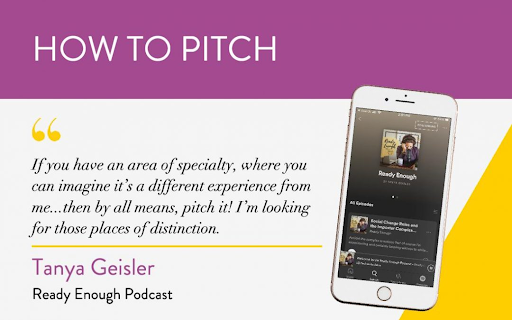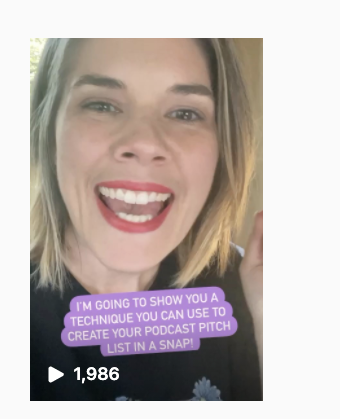We’re all about getting your business out there and featured on more podcasts. Why? Because podcast listeners are highly engaged and looking for specialized content. Now’s the time to share your expertise and build your following by booking interviews on the right shows.
Of course, just because you’ve decided you want to be a guest on a few podcasts doesn’t mean it happens overnight. What’s more, you might not even know where to start. We get a ton of questions about pitching podcasts here at Podcast Ally, and we’re answering them all here for you.
Are podcasts really a good marketing tool for my business?
If you’re a business owner looking to grow your reach, revenue, and expertise in your field, podcasts are the way to go. And we’re not just saying that because it’s our job.
The specialization and engagement of podcasts mean they are uniquely suited for generating new leads for your business, as you’re connecting directly with the audience you serve.
On top of that, podcast hosts are some of the most powerful influencers today. Meeting these influencers as a guest can supercharge your network and create new partnership opportunities.
Plus, 80% of podcast listeners tune in for most or all of an interview. As a podcast guest, you’ll have ample opportunity to gain your audience’s trust. That means you’re building your Know, Like, Trust factor and increasing the odds of a sale.
Plus, as of writing this in September 2021, people are listening to podcasts more than ever. Even with a traditional commute cut down by the pandemic, people are still listening to podcasts.
- 57% of Americans have listened to a podcast
- 41% are listening to a podcast at least once a month
- Podcasting has grown by 17% since 2020, and weekly audiences have nearly doubled since 2017
- The number of podcast listeners now exceeds the number of people who report using Twitter, TikTok, or Snapchat at least once
One of our favorite takeaways from the most recent research is this observation by Tom Webster, SVP or Edison Research:
“With 41% of the US population 12+ listening to at least one podcast in the last month, the odds are pretty good that the next time you go to a “place” and talk to “other people” (which will be later this year, I trust,) the odds are pretty good that you can talk about podcasts with the people you meet, and not only won’t they look at you funnily, they will likely have a favorite show of their own.”
Plus, because the pandemic has affected in-person speaking opportunities, podcasts are now prime real estate for sharing your message and offers with an engaged audience. Because of the evergreen nature of a podcast, it allows you to drive traffic and interest for longer than, say, a summit or a webinar.
And unlike the latest TikTok trend, the results you get from podcast pitching can net massive ROI for your business. So… why aren’t you pitching podcasts yet?
Which podcasts should I pitch first?
With half a million active podcasts currently listed in Apple Podcasts, figuring out where to start can be beyond daunting. And if this is your first time pitching a podcast, you might feel overwhelmed or intimidated reaching out to someone cold.
That’s why we recommend sending your first pitch to a podcast you have a connection to. If you can identify a podcast host is hosting the kind of interview you want to give within your own network, it will help you overcome those first two hurdles:
- Your pitch will be more warm and natural, which is how you want all your pitches to come across!
- It’ll be much easier for you to get their contact info, removing that easy excuse to put off your pitching.
If you don’t know any hosts that fit this bill, you can also ask your network if they know anyone who would enjoy hearing from you.
If you are switching industries and don’t have contacts that can help, don’t be afraid to start with a list of cold-for-now contacts. Our founder, Brigitte Lyons, recently shared one of our quickest and easiest hacks for finding podcasts that would be interested in having you on as a guest.
For this example, we show you how to quickly pull together a list of podcasts that would feature an author, but you can use this kind of research to build any kind of outreach list. Simply substitute a book with the name of a competitor or someone you admire in your industry.
And if all else fails, we have one final and very special hack for you: our list of 50 podcasts that interview CEOs and founders.
Can I pitch podcasts if I’m not established quite yet?
We often hear from people who want to be on podcasts “someday” when they’re more well-known in their respective fields. But do you know how well-known people got where they are today? By putting themselves out there! Podcast interviews are a great way to get known — you don’t have to be known to start. And they can’t be beat when it comes to meeting influencers on common ground.
Still concerned you’re not established enough to appear on someone’s podcast? Boiled down to its essence, all a pitch does is suggest an episode that will speak to someone’s audience. You don’t have to know everything about it or even be a well-known expert. You simply need to be able to present a new perspective — and you can do that well before you’ve become an “expert.” (We’d also argue that you’re already more of an expert than you think you are.)
What do I include in my pitch email?
We have data from hundreds of pitches and place 1 in 6 pitches that we send. So we know a few things about how to pitch podcasts in ways that get you booked. Our first tip? Create a list of topics you could bring to audiences.
Don’t try to come up with a new topic for each pitch, either. Create a “best hits” list. Not sure how to create this list? The best topics:
- challenge conventional wisdom, or
- speak to a specific challenge you’ve overcome and inspire the audience
When we work with new clients, it’s very common for them to want to share a general educational topic that reaches a lot of people, but the more niche and detailed your topics are, the better!
Now, we don’t recommend including a lengthy bio, blog posts, or background on who you are. Focus on the message and what you can bring to their audience on the first pitch.
Why is no one responding to my pitches?
Before you panic about not getting any responses (even a “No thank you!”), think about the season you’re in. Most podcasts take a break during the summer and many do a heavy recording push in spring to carry them through Q3.
So, if you’re wondering when your dream podcast will reply to that pitch and you’re deep in summer, you may start hearing back from those podcasts closer to fall. Similarly, many US-based podcasters take a break from interviewing from Thanksgiving through the New Year.
If you don’t think there’s a seasonal reason for the lack of responses, it’s time to look at your pitch emails. Are you providing a clear proposition? Are you showcasing the value of the topic you want to discuss? Have you customized the pitch for the podcast you want to book?
We’ve seen podcast pitches sent to podcasts that don’t accept guests (whoops), pitches that include the wrong name of the host or show, and that don’t provide a clear outline of the topic. Make sure you’re not making these podcast pitch faux pas before you write off podcast pitching forever.
How many podcasts should I expect to pitch before I book one?
You’re not going to hit every pitch out of the park and not every pitch is going to be accepted. But you should get some pitches accepted. On average, we’d say 1 out 10 is a great acceptance rateck. If you’ve gotten 3 or more interview requests, you’re on the right track. Keep going! to aim for. Here at Podcast Ally, we get a 17% booking rate, where 1 in 6 pitches we send leads to an interview.
But it’s not just about quantity. Podcast hosts tend to batch their interviews, so you often won’t hear back for a month or more with your first pitches. If this is your first time doing outreach, start by sending 30-40 over two months and measure how many responses you get back.
If you’re not or better booking 1 out of 10 podcasts, you might want to consider the podcasts you’re reaching out to. Do they actually interview guests? Are they “too big” in the space, meaning your pitch could be one of thousands? Did your topic resonate with their overall message or was it a stretch? You also might want to consider spam filters. Are you sending from a reputable email address, or from an account that looks spammy, like alex85connor02@gmail.com?
How many follow-ups should I send?
Pitching podcasts can feel tedious and you’re probably wondering how many times you should follow up if you don’t hear back. Once? Four times? What’s the right number?!
Recently, we calculated our booking rates for clients and discovered that ,out of the podcasts our clients book (about 1 in 6 pitches), 80% of bookings happened after the first pitch. 20% of bookings happened from our FIRST follow-up. The real kicker? No bookings happened from the second follow-up.
What does that mean for you? It means you really have to nail that first pitch. To do that, think about how to show your distinct perspective or unique niche. Those sorts of stand-alone conversations are what podcast hosts are looking for. Definitely listen to our episode, How to Pitch: Ready Enough Podcast, if you want to hear more about using what makes you different to stand out with your pitches.

If you haven’t had luck pitching podcasts yourself, but know that podcasts are your path to more reach and better business growth, come work with us! You can start the process to better podcast bookings here. (Please note, applications are based on availability.)
There’s one podcast I’d love to be on. How do I approach them?
This one’s easy! Check out our How to Pitch Interview series to see how podcasters in different categories like to be approached. You should also review their websites and pitch submission forms. They’ll tell you exactly what you need to know about booking a spot on their show.
A podcast accepted my pitch! Now what?
Being a guest on a podcast can be exciting, but you want to make the most of your time with their audience. Make sure to:
- Brainstorm 3-5 questions you’ll be asked (and prepare answers)
- Tell relevant stories and give examples
- Know what to plug that fits the discussion (and benefits listeners)
- Check out our other tips over on Instagram
You can also prepare bio, some blog posts or background on who you are, and share your headshot.
Have other questions we didn’t answer here?
We love hearing from business owners who’ve decided that podcast pitching is the next best step for them. We hope these FAQs have helped you learn how to get started and what to do as you go through your pitching journey. Of course, we know this list is by no means exhaustive. If you have another question you’d like to answer, leave a comment down below.
Want more insights into podcast pitching and how to make the most of your efforts? Make sure you’re on our Podcast Ally weekly newsletter list. We share podcast trends, interviews with hosts to improve your pitching and booking rates, and more.


